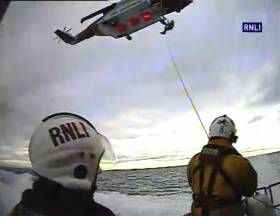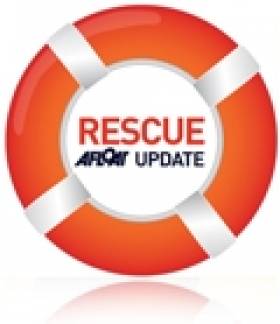Displaying items by tag: Prestwick
Larne Lifeboat Crew Train Alongside Prestwick Coastguard Helicopter
#RNLI - Larne RNLI launched their all-weather lifeboat Dr John McSparron and inshore lifeboat Terry on Sunday (29 January) to take part in the exercise to simulate recovery of a casualty to a helicopter in an emergency situation.
The joint exercise with the Prestwick Coastguard helicopter Rescue 999 took place one mile north of Larne in Co Antrim.
The lifeboats practiced manoeuvres at speed with the helicopter. A high-line was passed to the all-weather lifeboat, where the winchman landed. Several RNLI crew members were then winched into the helicopter and back onto the deck of the lifeboat.
The RNLI regularly carries out exercises with other rescue agencies, training that ensures rescue crews are able to work together effectively in an emergency situation, including medical evacuation of a casualty to a helicopter.
Larne RNLI second coxswain Norman Surplus said: “We had a very valuable training session with both our lifeboats working under the helicopter in turn. During the joint RNLI–Coastguard exercise all our volunteer crew members reinforced their overall skills knowledge and their hands-on experience of specialised Helicopter operations.
“Close and effective collaboration during such RNLI–Coastguard joint training allows the combined emergency services to be much better prepared to handle real search and rescue situations as and when they arise.”
Larne RNLI extended their thanks to Prestwick Coastguard in Western Scotland for the opportunity to carry out the joint exercise.
Scottish Search and Rescue Base UK's Busiest in 2011
#RESCUE - The Royal Navy search and rescue unit at HMS Gannet was the busiest in the UK last year, STV News reports.
The unit - based in Prestwick, near Glasgow - responded to nearly 300 call-outs and rescued 240 people in Scotland, northern England and Northern Ireland throughout 2011 with its fleet of Sea King helicopters.
The big numbers put HMS Gannet at the top of the UK's 12 search and rescue units for the fifth year running.
"Like all emergency services, we work under significant pressure and always aim to provide the best service we possibly can," said HMS Gannet's Lieutenant Commander Debdash Bhattacharya. "Frequently lives depend on it."
Since 2007 the unit has rescued 1,575 people from 1,865 call-outs in total. Last year's call-outs represented 17% of all call-outs from military bases in the UK.
STV News has much more on the story HERE.






























































